 |
|||||||||




 |
|||||||||




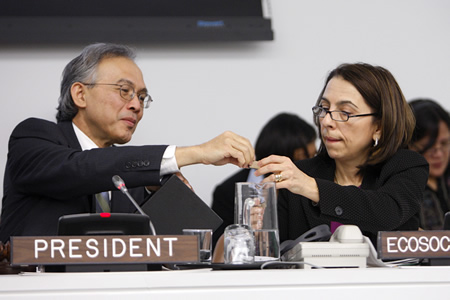
Photo: November 10, 2010. Hamidon Ali (left), Permanent Representative of Malaysia to the UN and President of the Economic and Social Council (ECOSOC), chairs the Council's election of 41 members of the Executive Board of the newly-established United Nations Entity for Gender Equality and the Empowerment of Women (UN Women). United Nations, New York. UN Photo/Ryan Brown.
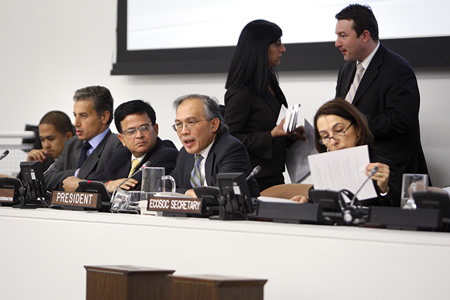
Photo: November 10, 2010. Hamidon Ali (second from right), Permanent Representative of Malaysia to the UN and President of the Economic and Social Council (ECOSOC), chairs the Council's election of 41 members of the Executive Board of the newly-established United Nations Entity for Gender Equality and the Empowerment of Women (UN Women). United Nations, New York. UN Photo/Ryan Brown.
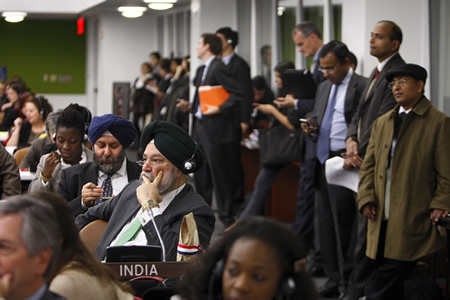
Photo: November 10, 2010. A view of representatives of Member States, including Hardeep Singh Puri (seated front), Permanent Representative of India to the UN, at the Economic and Social Council (ECOSOC)'s election of the 41 members of the Executive Board of the newly-established United Nations Entity for Gender Equality and the Empowerment of Women (UN Women). India was among those elected. United Nations, New York. UN Photo/Ryan Brown.
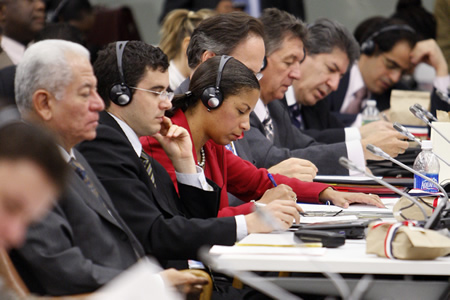
Photo: November 10, 2010. A view of representatives of Member States, including Susan Rice (third from left), Permanent Representative of the United States of America to the UN, inside the Economic and Social Council (ECOSOC) Chamber as they vote for the 41 members of the Executive Board of the newly-established United Nations Entity for Gender Equality and the Empowerment of Women (UN Women). The United States was among those elected. United Nations, New York. UN Photo/Ryan Brown.
• The UN Economic and Social Council (ECOSOC) has elected the 41 inaugural members to the Executive Board of UN Women (United Nations Entity for Gender Equality and the Empowerment of Women), the new entity established to meet the unique and under-represented needs of women and girls worldwide.
The Council elected the following countries to the Executive Board of "UN Women": Angola (3 years), Argentina (2 years), Bangladesh (2 years), Brazil (2 years), Cape Verde (3 years), China (3 years), Congo (3 years), Côte d'Ivoire (2 years), Democratic Republic of the Congo (2 years), Denmark (3 years), Dominican Republic (3 years), El Salvador (2 years), Ethiopia (3 years), Estonia (2 years), France (2 years), Grenada (3 years), Hungary (3 years) and India (2 years).
It also elected Indonesia (3 years), Italy (2 years), Japan (3 years), Kazakhstan (3 years), Lesotho (2 years), Libya (2 years), Luxembourg (3 years), Malaysia (2 years), Mexico (3 years), Nigeria (3 years), Norway (3 years), Pakistan (2 years), Peru (3 years), Republic of Korea (3 years), Russian Federation (2 years), Saudi Arabia (3 years), Spain (3 years), Sweden (3 years), Timor-Leste (2 years), Ukraine (3 years), United Kingdom (3 years), United States (3 years) and the United Republic of Tanzania (2 years).
Six seats on the Board would be filled by "contributing countries" serving three-year terms. As such, Norway, Spain, United Kingdom and the United States were elected to fill seats allocated for four of the top ten providers of voluntary core contributions to the Entity.
|GlobalGiants.Com|
Edited & Posted by the Editor | 12:54 PM | View the original post
Failure to adjust to new realities will only perpetuate uncertainty and volatility, the report warns.

In the fourth quarter issue of the Global Economic Outlook, Deloitte Research economists examine the current economic environment and, in particular, the varied pace of growth and global imbalances impacting nine of the world's major markets: the United States, Eurozone, China, India, Japan, United Kingdom, Russia, Brazil, and Australia.
"The global economy is imbalanced," says Ira Kalish, Director of Global Economics, Deloitte Research, part of Deloitte Services LP in the United States. "The money is flowing out of developed countries that have been supporting unusually low interest rates for some time into higher interest rate emerging countries. At the same time, rapid growth in emerging markets is creating new inflationary pressures. Many governments are intervening in their currency markets to improve export competitiveness, further exacerbating inflation.

"Additionally, countries that have traditionally relied on exports -- China, Japan, Germany -- and need to move toward domestic-led growth continue to depend heavily on exports. Meanwhile, countries that have relied heavily on consumer spending (the U.S. and UK), and need to export more face competitive devaluations in their target export markets. Even though the adjustments needed to address these new realities will involve short-term pain, the failure to do so will only delay the day of reckoning."

Highlights of the Q4 issue include:
• The United States is currently experiencing an epidemic of thrift as banks, non-financial corporations, and households hoard cash. Expanding the money supply and sparking inflation can result in stronger spending. While embracing higher inflation is a high risk strategy, it's also the path of least resistance out of the post-credit crisis liquidity trap that is currently inhibiting growth.
• The economic imbalances in the Eurozone continue. Strong export-driven growth in Germany and France is spilling over to the domestic sector, but fringe countries are still struggling as a result of financial market stress. The imminent move toward tighter regulation and stricter controls will be painful in the short run, but is ultimately likely to help the Eurozone to become a truly integrated economic region.
• The Chinese economy appears headed for a soft landing, as opposed to a full blown deceleration, which is good news -- both for China's trade partners and China. Yet, China's shifting demographics -- starting in 2011, the number of dependents (mainly retirees) will rise faster than the number of workers, reversing the trend of the past two decades when the ratio of dependents to workers has been declining -- is likely to lead to slower future growth.
• The outlook on the Indian economy is generally positive. A good harvest season is expected to help feed the substantial appetite for consumption in the domestic sector. But policymakers will have to address the appreciating rupee and rising inflation.
• The Japanese economy remains weak due to stagnant consumer spending and decelerating business investment amidst a small surge in imports. Moreover, the current political turmoil in the country is not conducive to economic success. Reviving consumer and business confidence will be keys to Japan's success.
• In the United Kingdom a surprisingly strong recovery will likely be followed by a slowdown in growth. As the United Kingdom rebalances the economy toward industrial production, exports and capital spending, consumers and government will likely play less of a role as drivers of growth.
• Policy-makers in Russia are facing significant disparities. They must balance concerns about growth and currency values with worries about potential inflation. They must also weigh the desire to invest in new infrastructure with aspirations to limit government debt. Longer term, the possibility of joining the World Trade Organization could help Russia diversify away from an excessive dependence on commodities.
• Brazil's economy is rapidly growing. Cooling down the economy may not be an easy task. The country's next president will have to safeguard against hyper-inflation and a rising currency.
• In Australia, the growth that was punted by government funding and healthy export volumes may not carry forward to future quarters. A slowdown in global economic conditions hint at some deceleration ahead.
|GlobalGiants.Com|
Repeated
"REQUIRED.
An Official World Stock Markets Watchdog that, without any interference, identifies and monitors those stocks, stock exchanges, and stock indexes, whose activities produce worldwide repercussions.
It would help the governments and the regulators in formulating their relevant policies and in preventing another financial catastrophe."
© GlobalGiants.Com. All Rights Reserved.
Additional Comment: The United Nations along with the International Monetary Fund (IMF), whose one of the functions is to secure global financial stability, ought to take the initiative towards the establishment of such an official watchdog.
Edited & Posted by the Editor | 2:32 AM | View the original post
Global Research Benchmarking System for University Performance.
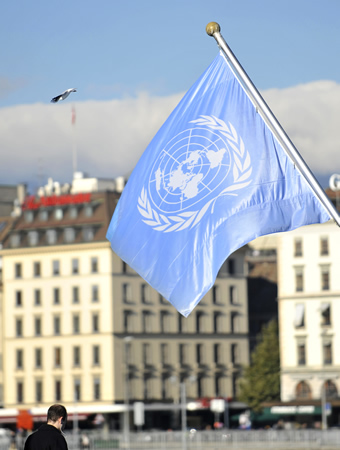
Photo: October 21, 2010. The United Nations flag flies on the Pont du Mont-Blanc, one of the bridges spanning the Rhone River in Geneva, Switzerland. UN Photo/Jean-Marc Ferre.
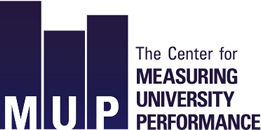
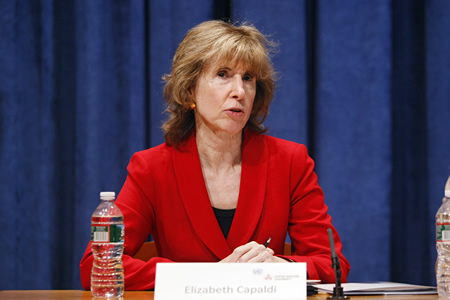
Photo: October 20, 2010. Elizabeth Capaldi, Provost of Arizona State University and Co-Editor at the Center for Measuring University Performance, briefs correspondents on a new alliance for measuring university performance called the Global Research Benchmarking System (GRBS). United Nations, New York. UN Photo/Paulo Filgueiras.
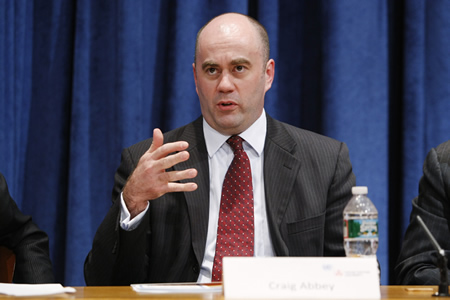
Photo: October 20, 2010. Craig Abbey, Assistant Vice President for Academic Planning and Budget of the State University of New York (SUNY) at Buffalo and Research Director of the Center for Measuring University Performance, briefs correspondents on a new alliance for measuring university performance called the Global Research Benchmarking System (GRBS), conceived by Mr. Abbey's Center and the UN University International Institute for Software Technology (UNU-IIST). United Nations, New York. UN Photo/Paulo Filgueiras.
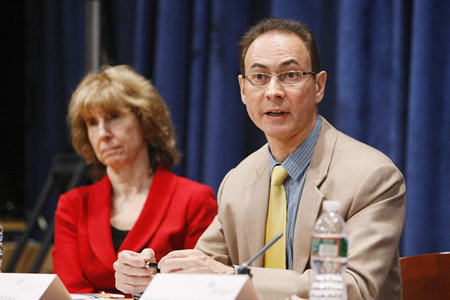
Photo: October 20, 2010. Peter Haddawy, Director of the United Nations University International Institute for Software Technology (UNU-IIST), briefs correspondents on a new alliance for measuring university performance called the Global Research Benchmarking System (GRBS). Pictured next to him is Elizabeth Capaldi, Provost of Arizona State University and Co-Editor at the Center. United Nations, New York. UN Photo/Paulo Filgueiras.
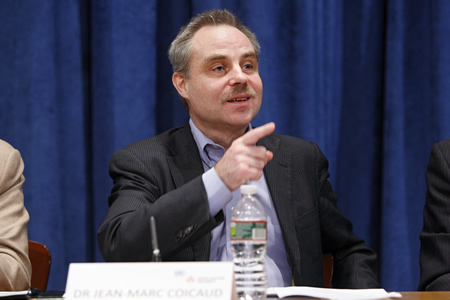
Photo: October 20, 2010. Jean-Marc Coicaud, Director of the United Nations University Office in New York, moderates the press conference launching a new alliance for measuring university performance called the Global Research Benchmarking System (GRBS). United Nations, New York. UN Photo/Paulo Filgueiras.
• Announcing the launch of the Global Research Benchmarking System (GRBS) at the UN Headquarters in New York, Jean-Marc Coicaud, Director of the United Nations University, said that university performance was comprised of complex and informative components and, as such, more than numbers defined their ranking.
The newly formed Global Alliance for Measuring University Performance would be developing the benchmarking system. The Alliance's collaborating partners include universities from around the world, the United States-based Center for Measuring University Performance, the United Nations University's International Institute for Software Technology (UNU-IIST) and Elsevier, one of the world's largest science publishers.
"As an academic and intellectual analysis project, all of the data would be publicly available, downloadable, and all the measures picked would ensure reliable and valid sources," said Elizabeth Capaldi, Provost of Arizona State University and Co-Editor at the Center for Measuring University Performance. "That would offer governing bodies and institutions information that would help them manage their operations more efficiently."
Peter Haddawy, Director of UNU-IIST, in an overview of the project, described the "broad vision of the Alliance", which, by providing objective data to universities, would help universities improve their performance in all areas, including education, community engagement, and research, as well as the societal impact of their activities. The Alliance's first project would be a benchmarking initiative on evaluating university research performance. That was "so important", he said, and should be done in a rigorous manner with full participation of the academic community.
• The benchmarking system overall was in stark contrast to existing university ranking systems, he said. The "richness of the contributions of the universities can't be represented by simple number in a lead table." Their contributions were much more complex and the new system would be designed to measure and represent that.
|GlobalGiants.Com|
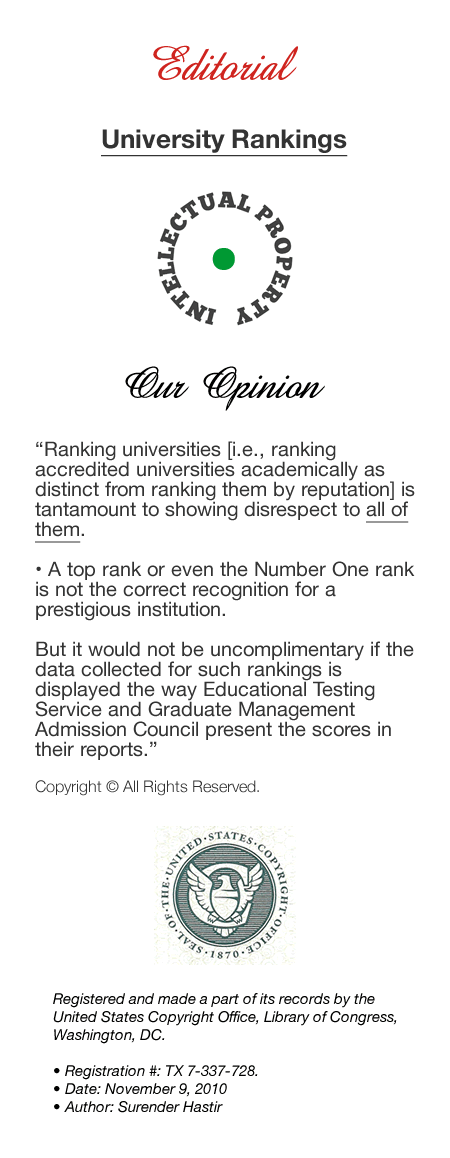

Edited & Posted by the Editor | 3:24 AM | View the original post
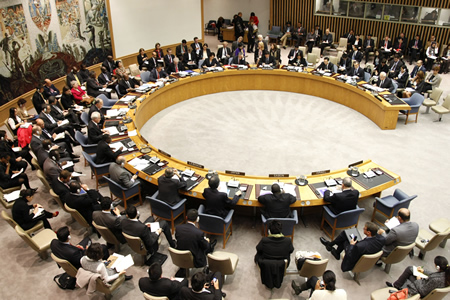
Photo: October 18, 2010. Security Council Meets on Situation in Middle East. A wide view of the Security Council at its meeting on the situation in the Middle East, including the question of Palestine. United Nations, New York. UN Photo/Paulo Filgueiras.
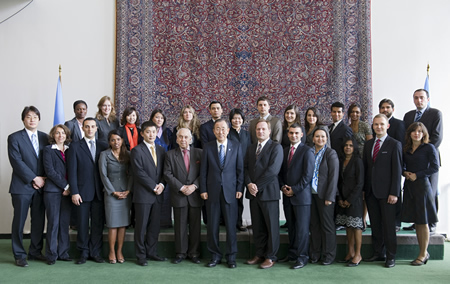
Photo: October 14, 2010. Secretary-General Ban Ki-moon (centre) and Sergio de Queiroz Duarte (left of Mr. Ban), High Representative for Disarmament, pose for a group photo with participants of the 2010 United Nations Programme of Fellowship on Disarmament. United Nations, New York. UN Photo/Mark Garten.
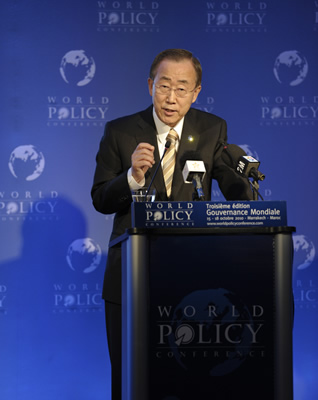
Photo: October 16, 2010. Secretary-General Ban Ki-moon addresses the opening session of the third World Policy Conference, organized by the Institut Français des Relations Internationales (IFRI), in Marrakesh, Morocco. UN Photo/Eskinder Debebe.
• United Nations has released UN Secretary-General Ban Ki-moon’s following message for United Nations Day, to be observed on October 24, 2010:
“On United Nations Day, I express my great appreciation to the millions of people throughout the world who believe deeply in our work for peace, development and human rights, and who uphold our ideals and help us achieve our goals. To all of you, friends and fellow citizens of the world, I say: thank you.
Sixty-five years ago on this date, the founding Charter of the United Nations entered into force. Every year on UN Day, we reaffirm our global mission. We reassert the universal values of tolerance, mutual respect and human dignity. And we recognize the progress we have made together: gains in literacy and life expectancy; the spread of knowledge and technology; advances in democracy and the rule of law.
But above all, United Nations Day is a day on which we resolve to do more. More to protect those caught up in armed conflict, to fight climate change and avert nuclear catastrophe; more to expand opportunities for women and girls, and to combat injustice and impunity; more to meet the Millennium Development Goals.
Last month’s Millennium Development Goals Summit at the United Nations generated political momentum as well as financial commitments that are especially significant in these difficult economic times. I am determined to press ahead as the 2015 deadline approaches.
Despite our problems, despite polarization and distrust, our interconnected world has opened up vast new possibilities for common progress. Let us commit to do even more to realize the great vision set out in the United Nations Charter.”
|GlobalGiants.Com|
“I am not an Athenian or a Greek, but a citizen of the world.”
— Diogenes.
Edited & Posted by the Editor | 12:40 PM | View the original post
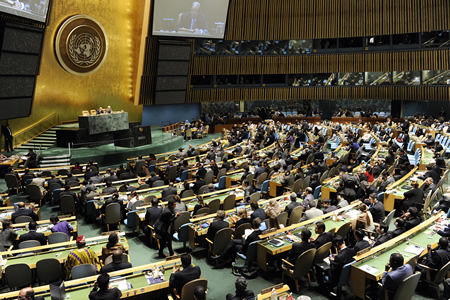
Photo: October 12, 2010. Wide view of the United Nations General Assembly Hall during the meeting at which the Assembly elected five states -- Colombia, Germany, India, Portugal and South Africa -- as non-permanent members of the Security Council for two-year terms beginning in January 2011. United Nations, New York. UN Photo/Evan Schneider.
|GlobalGiants.Com|
Edited & Posted by the Editor | 8:34 AM | View the original post
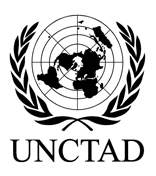

• World Investment Forum of the United Nations Conference on Trade and Development (UNCTAD) has just concluded in Xiamen, China.
• Welcoming more than 1,800 participants, including 460 senior officials from 120 countries, the UNCTAD Secretary General, Dr Supachai Panitchpakdi officially opened the Forum, pointing to the distinctive status of the World Investment Forum 2010 as the key international event of the investment community involving global leaders, senior policy-makers, corporate executives, investors, investment promotion agencies, and investment experts from all over the world.
Transnational corporations (TNCs) play an ever more important role in sustainable development as conduits of capital, technology, and management know-how. Increasingly, TNCs are being called upon to address broader Environmental, Social and Governance (ESG) issues. At the same time large globally active investment institutions are becoming increasingly aware of the potential impact of a range of non-financial issues (e.g. climate change, human rights, corporate governance practices) on an investment proposition.
The World Investment Forum (WIF) is the global forum on investment and development issues organized by the United Nations Conference on Trade and Development (UNCTAD). Held biennially, the forum aims to strengthen international cooperation in the interest of promoting international investment and its contribution to economic growth and development.

WIF 2010 brings together all investment stake-holders, including governments, businesses, international organizations, investment promotion agencies (IPAs), civil society, and international investment experts and practitioners from across the world.
Organized by UNCTAD in partnership with the Ministry of Commerce of China, WIF 2010 is supported by a range of international partners and sponsors, including the World Association of Investment Promotion Agencies, the International Chamber of Commerce, the United Nations Global Compact and the Principles for Responsible Investment.
• There, UNCTAD presented its "Investment and Enterprise Responsibility Review".
This Review, the first of its kind, finds that the world's largest Transnational Corporations (TNCs) and private investment institutions frequently publish information on their social and environmental polices, but that there is wide variation in how such firms and institutions adopt, implement, and report on such matters, undermining the comparability and usefulness of the information.
The study recommends that corporate reporting and investor responsibility standards be upgraded to ensure the public interest is being served.
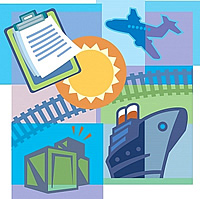
This review of the current state of practices in the area of Corporate Social Responsibility (CSR) among the world's 100 largest TNCs and Responsible Investment (RI) among the 100 largest institutional investors reveals a number of important insights:
1. Private policy at a large enough scale can have an impact similar to, or greater than, public policy. As a result, CSR has emerged as an important area of soft law self-regulation (or 'soft-regulation'). CSR can present policy makers with new options and tools for addressing key development challenges.
2. Most large TNCs now recognise the importance of CSR yet the standard of communication varies widely. There is a role for policy makers to enhance the quality of communications. Various policy options exist such as supporting the harmonization of CSR reporting, and mandating such standardized reporting through stock exchange listing requirements.
3. Responsible investment practices (efforts by investors to incorporate ESG issues into investment decisions and to engage with investee companies to encourage ESG practices) have become common features of the world's 100 largest pension funds. Regulators can work to strengthen the mechanisms through which institutional shareholders are able to influence the ESG practices of the companies in which they invest, while also encouraging investors to formally articulate their stance on ESG issues in public reports.
4. At least basic climate change related information is now reported by most large TNCs. However significant inconsistencies and inadequacies among company reports undermine the comparability and usefulness of this information. Unless reporting is produced in a consistent and comparable manner, it is difficult for policy makers, investors and other stakeholders to use it to make informed decisions. Policy makers could promote an internationally harmonized approach to the way companies explain, calculate and define climate change related emissions.
5. A number of voluntary initiatives are taking a leading role in designing and facilitating CSR and responsible investment instruments, encouraging improved corporate communication on ESG issues and creating important benchmarks, based on universally agreed principles. Policy makers can become involved in these initiatives with the aims of promoting sustainable development goals and identifying useful tools to complement government rules.
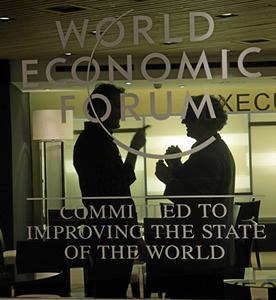
• Meanwhile, World Economic Forum has released its Global Competitiveness Report 2010-2011. Switzerland tops the overall rankings. The United States falls two places to fourth position, overtaken by Sweden (2nd) and Singapore (3rd).
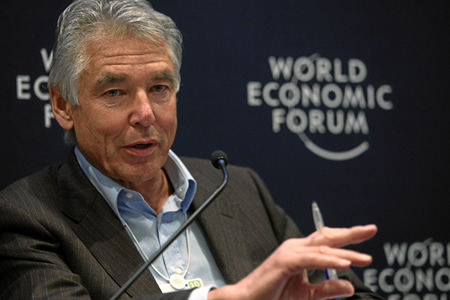
Photo: Peter Brabeck-Letmathe, Chairman of the Board, Nestle, Switzerland; Member of the Foundation Board of the World Economic Forum; Global Agenda Council on Water Security, speaks during the session 'Rebuilding Water Management' in the Congress Centre of the Annual Meeting 2010 of the World Economic Forum in Davos, Switzerland, January 30, 2010 (© World Economic Forum/Remy Steinegger.
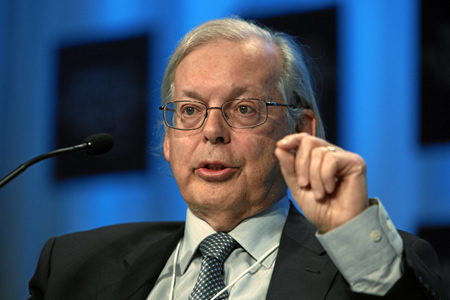
Photo: Yvan Allaire, Chair of the Board of Directors, Institute for Governance of Public and Private Organizations (IGOPP), Canada; Global Agenda Council on the Role of Business, speaks during the session 'Rethinking Values in the Post-Crisis World' at the Annual Meeting 2010 of the World Economic Forum in Davos, Switzerland, January 27, 2010 (© World Economic Forum/Remy Steinegger).
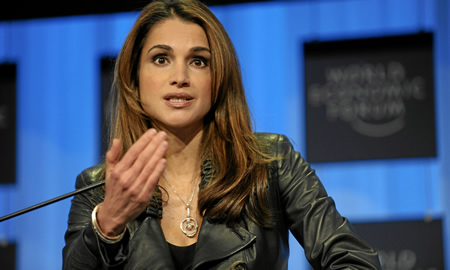
Photo: Queen Rania Al Abdullah, H.M. Queen Rania Al Abdullah of the Hashemite Kingdom of Jordan; Member of the Foundation Board of the World Economic Forum; Global Agenda Council on Education Systems captured during the session 'Rebuilding Education for the 21st Century' at the congress centre at the Annual Meeting 2010 of the World Economic Forum in Davos, Switzerland, January 30, 2010. (© World Economic Forum/ Michael Wuertenberg).
According to the WEF report, in addition to the macro-economic imbalances that have been building up over time, there has been a weakening of the United States' public and private institutions, as well as lingering concerns about the state of its financial markets. The Nordic countries continue to be well positioned in the ranking, with Sweden, Finland (7th) and Denmark (9th) among the top 10, and with Norway at 14th. Sweden overtakes the US and Singapore this year to be placed 2nd overall. The United Kingdom, after falling in the rankings over recent years, moves back up by one place to 12th position.
The People's Republic of China (27th) continues to lead the way among large developing economies, improving by two more places this year, and solidifying its place among the top 30. Among the three other BRIC economies, Brazil (58th), India (51st) and Russia (63rd) remain stable. Several Asian economies perform strongly, with Japan (6th) and Hong Kong SAR (11th) also in the top 20. In Latin America, Chile (30th) is the highest ranked country, followed by Panama (53rd) Costa Rica (56th) and Brazil.
Several countries from the Middle East and North Africa region occupy the upper half of the rankings, led by Qatar (17th), Saudi Arabia (21st), Israel (24th), United Arab Emirates (25th), Tunisia (32nd), Kuwait (35th) and Bahrain (37th), with most Gulf States continuing their upward trend of recent years. In sub-Saharan Africa, South Africa (54th) and Mauritius (55th) feature in the top half of the rankings, followed by second-tier best regional performers Namibia (74th), Botswana (76th) and Rwanda (80th).
• View All Countries Rankings in the Global Competitiveness Report 2010-2011
• The World Economic Forum, based in Geneva, Switzerland, is an independent international organization committed to improving the state of the world by engaging leaders in partnerships to shape global, regional and industry agendas.
• While the United Nations Conference on Trade and Development (UNCTAD) is a permanent intergovernmental body. It is the principal organ of the United Nations General Assembly dealing with trade, investment, and development issues. UNCTAD has 193 member States and is headquartered in Geneva, Switzerland.
|GlobalGiants.Com|
Edited & Posted by the Editor | 1:01 PM | View the original post

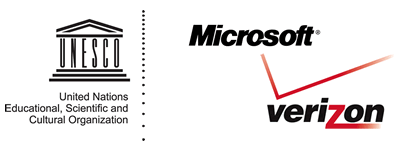
• The highlight of the International Literacy Day celebrations on September 8 at UNESCO Headquarters in Paris would be the launch of a new Knowledge and Innovations Network for Literacy (KINL) that will enable researchers and practitioners all over the world to link up and share information and best practices.
• The Knowledge and Innovations Network for Literacy (KINL) has been created with support from Verizon Foundation and Microsoft.
The Network is a virtual workplace where literacy researchers and practitioners can link up, share knowledge and debate literacy topics on line. The network will generate knowledge and innovation in support of the acquisition and use of literacy, and promote advocacy, policy formulation and program delivery, as well as cooperation and partnerships.

Photo: Early Childhood Care and Education. Dublin Community Program. A young girl chats with her Dad during the associated parent and toddler group meeting. Dublin, Ireland. (© UNESCO/Niamh Burke).

Photo: Early Childhood Care and Education. The Dublin Community Mothers' Program operates through experienced local mothers who give guidance to first-time mothers in certain communities. In this image, a young boy learns to read with one of the Programs' community mothers. Dublin, Ireland. (© UNESCO/Niamh Burke).
Participating in the KINL launch will be UNESCO Goodwill Ambassador Cheick Modibo Diarra, who is Microsoft Corporation's Chairman for Africa and Literacy Champion; and Marc Gosselin, representative of Verizon Foundation.
"Promoting literacy requires action from both the public and private sectors; we are all stakeholders in the fight to eradicate illiteracy," said Dr. Diarra about KINL. "Microsoft shares UNESCO's belief that technology can play an important role in doing so by providing access to education solutions and curriculum for both basic and digital literacy and helping more people participate in the global information society."
Verizon Foundation President Patrick Gaston said, "If we are to create a seismic shift in the literacy landscape, education and literacy leaders from around the world must be able to communicate with one another and collaborate. The Knowledge and Innovations Network for Literacy will provide literacy leaders from every nation with easy access to the resources needed to ensure that every child is literate. The Verizon Foundation is proud to partner with UNESCO on this transformational project."
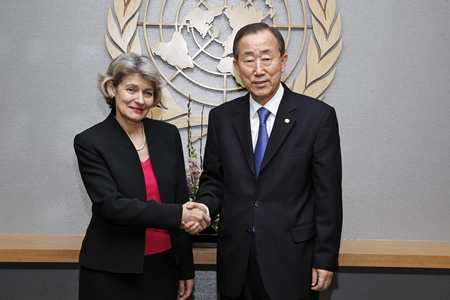
Photo: Secretary-General Ban Ki-moon meets with Irina Bokova, newly-elected Director General of the United Nations Educational, Scientific and Cultural Organization (UNESCO). 19 January 2010. United Nations, New York. UN Photo/Paulo Filgueiras.
Following are the two other main events that will take place at UNESCO Headquarters in Paris on the International Literacy Day:
1. Annual 2010 International Literacy Prize Awards Ceremony.
2. Round Table on "Literacy and Women's Empowerment".
UNESCO's Director-General Irina Bokova is, however, flying to New York to give a keynote address at the United Nations international conference "Literacy: an essential foundation for development".
There, the former First Lady of the United States, Laura Bush, who is Honorary Ambassador for the UN Literacy Decade (UNLD), will give the opening address.
|GlobalGiants.Com|
Edited & Posted by the Editor | 12:41 PM | View the original post
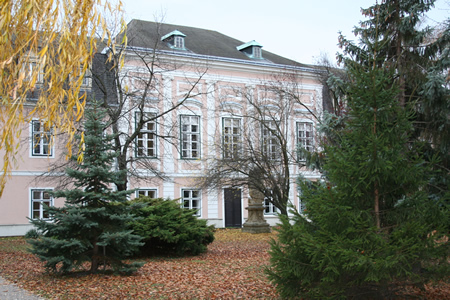
Photo: International Anti-Corruption Academy (IACA) Building, Vienna, Austria.
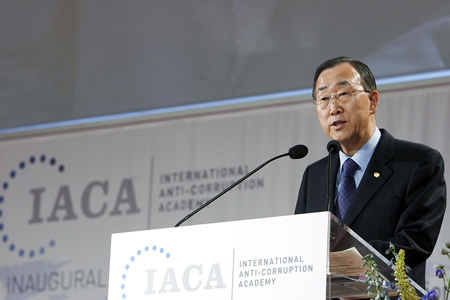
Photo: Secretary-General Ban Ki-moon addresses the inaugural conference of the International Anti-Corruption Academy, in Vienna. UN Photo/Mark Garten.
• UN Secretary-General Ban Ki-moon today inaugurated the International Anti-Corruption Academy (IACA) in Vienna, Austria.
Addressing the Inaugural Conference, the UN Secretary-General said: "The launch of the International Anti-Corruption Academy is a milestone in the efforts of the international community to fight corruption. It has great potential to advance the goals of the landmark United Nations Convention against Corruption."
Mr. Ban added that while too often in the past corruption was perceived as a fact of life, today attitudes are changing. "Across the world, intolerance of corruption is growing. The establishment of this Academy responds not only to this increasing sense of outrage and injustice, but also to an urgent need to train the experts we need to conquer this global menace."
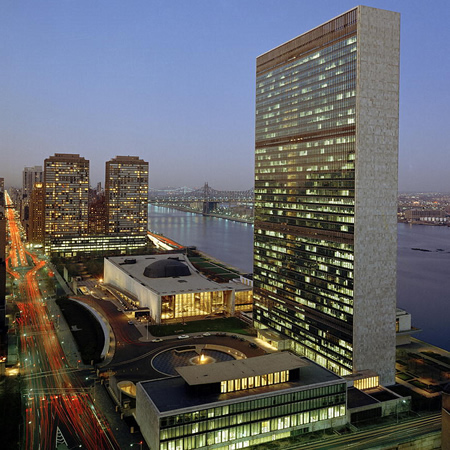
Photo: A view of the Headquarters of the United Nations in New York at sunset. UN Photo/Yutaka Nagata.
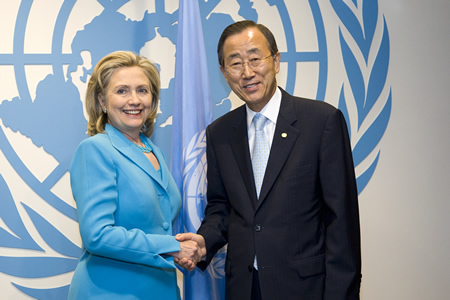
Photo: Secretary-General Ban Ki-moon meets with Hillary Rodham Clinton, Secretary of State of the United States of America. 19 August 2010. United Nations, New York. UN Photo/Mark Garten.
Noting that traditional methods are proving no match for new types of corruption, especially financial crimes, Mr. Ban said that the Academy will nurture a new generation of leaders in the public and private sectors - a global network of talented, like-minded professionals.
"The creation of a precise body of knowledge about a poorly researched and little-understood subject will shed more light on murky deals. If we can calculate inflation and GDP, it should not be beyond our abilities to develop an effective and scientific measure for corruption," he said.
After his address in Vienna's historic Hofburg Palace, which was attended by some 1,000 participants from 90 countries, Mr. Ban visited the campus where the first courses were already taking place.
IACA will offer tailor-made programs, including courses for practitioners from developing countries. Students will be able to pursue academic degrees while exchanging ideas and networking on campus. Finally, IACA will be a global think tank and a standard-setter for all matters related to corruption.
Internationally recognized scholars and experts will make up the teaching faculty. "Superior training coupled with advanced academic research will give those who need it a significant edge in their work," said Martin Kreutner, Head of the IACA Transition Team. "Their know-how will have a trickle-down effect in their countries and help create the conditions for change."
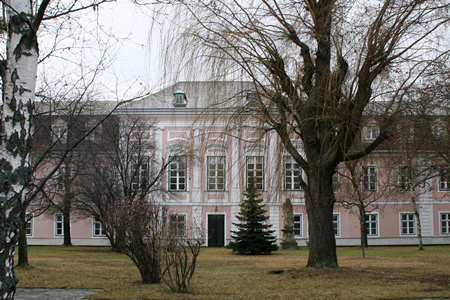
Photo: Back View of the International Anti-Corruption Academy (IACA) Building, Vienna, Austria.
IACA is pursuing partnerships with international organizations (such as the World Bank, the United Nations Development Program and the Organization for Economic Cooperation and Development), anti-corruption networks, international academic institutions and the private sector. Mr. Kreutner notes that "the increasing participation of private companies wishing to establish ethics compliance program is another exciting aspect of our work."
The Austrian Government is providing state-of-the-art premises in Laxenburg, near Vienna, to house the Academy, which will become an international organization in 2011.
• The International Anti-Corruption Academy (IACA) is the world's first educational institution dedicated to fighting corruption. Starting in September, it will train policy-makers in governments, the private sector and civil society, as well as professionals such as judges, investigators, prosecutors, police officers, regulators and academics from all over the world.
|GlobalGiants.Com|
Edited & Posted by the Editor | 1:51 PM | View the original post
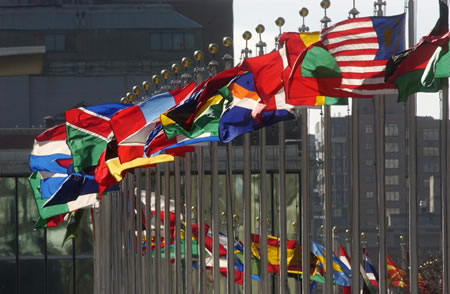
Photo: Outside the United Nations Headquarters, flags fly in the north end of the building, on a sunny fall day. UN Photo/Mark Garten.
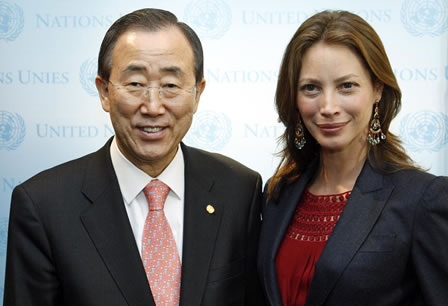
Photo: Secretary-General Ban Ki-moon (left) meets with Christy Turlington, model and maternal health advocate, at a documentary film forum entitled "Envision: Addressing Global Issues through Documentaries". This Millennium Development Goals-focused forum is the result of collaboration between the non-profit Independent Filmmaker Project (IFP) and the Department of Public Information. New York, United States. UN Photo/Mark Garten.
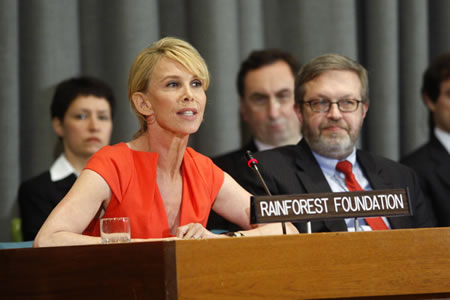
Photo: Trudie Styler, Co-founder of the Rainforest Foundation, addresses the General Assembly's informal meeting on climate change and the status of intergovernmental negotiations. Ms. Styler discussed the work of her foundation in protecting tropical rainforests and their indigenous populations. United Nations, New York. UN Photo/Evan Schneider.

Educators and administrators from 37 countries, meeting at the second UN Global Forum on Responsible Management Education, recently held in New York, called on business leaders to better balance social and economic objectives and encouraged management education to prepare future leaders for this challenge.
• At the end of the conference, participants representing business schools and other academic institutions exhorted business to emphasize societal value just as much as its commitment to shareholder return.
Assuring their support for researchers, task forces and associations dedicated to the globalization of business education and development of effective leaders, academic leaders participating in the forum reaffirmed their commitment to the Principles for Responsible Management Education (PRME). The UN-backed initiative was launched in 2007 to better prepare current and future organizational leaders for their dual roles as economic developer and societal servant.
The Global Forum for Responsible Management Education, was organized by the PRME Secretariat and hosted by Fordham University Schools of Business.
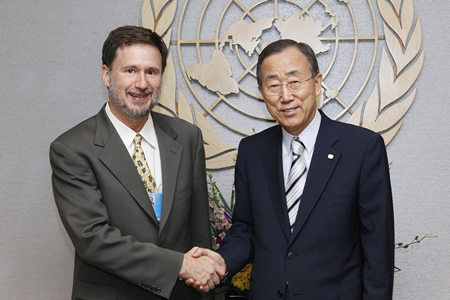
Photo: Secretary-General Ban Ki-moon (right) meets with Michael Doyle, Harold Brown Professor of U.S. Foreign and Security Policy at Columbia University. 28 July 2010. United Nations, New York . UN Photo/John McIlwaine.
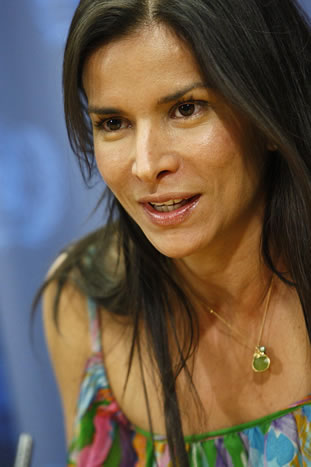
Photo: Actress and fashion model Patricia Velasquez addresses a press conference on the "Fashion for Development" project in Colombia and its implementation in the context of achieving the Millennium Development Goals. The project aims at applying traditional techniques in manufacturing goods for the fashion industry. United Nations, New York. UN Photo/Mark Garten.
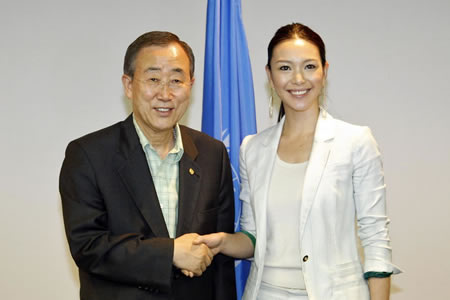
Photo: Secretary-General Ban Ki-moon meets with Kurara Chibana, United Nations World Food Programme Celebrity Partner and 2006 Miss Universe from Japan. Tokyo, Japan. UN Photo/Mark Garten.
• Following is the Declaration of the 2nd Global Forum for Responsible Management Education, New York, NY.
"For more than 100 years, management education has sought to provide business leaders with the tools to invigorate economic growth. Yet economic gain is no longer a solitary end in the hearts and minds of the globe's six billion people. Business must emphasize societal and environmental value just as much as its commitment to shareholder return. Management education must also enhance its curricula, pedagogy, research and incentives, as well as lead by example, to prepare organizational leaders who will balance economic and social development.
We support the numerous business schools and universities, companies, governments, civil society groups and associations dedicated to the globalization of business education and development of effective leaders. These initiatives inspire us to make management education the hallmark for responsible leadership.
The Principles for Responsible Management Education (PRME), written in 2007 and now endorsed by over 300 business schools from 62 countries, serve as guidelines for management education providers to better prepare current and future organizational leaders for their dual roles as economic developer and societal steward. Yet with more than 12,000 business degree granting institutions worldwide, our job has just begun. We aspire to the goal of 1,000 PRME schools by 2015. We urge business schools to adopt the Principles and organizations to balance their economic and social objectives.
-- Endorsed by the participants of the 2nd Global Forum for Responsible Management Education."
• Launched in 2007, the Principles for Responsible Management Education (PRME) provide framework for academic institutions to advance corporate social responsibility through the incorporation of universal values into curricula and research. The PRME is coordinated by a Steering Committee constituted of the Association to Advance Collegiate Schools of Business (AACSB International), the European Foundation for Management Development (EFMD), the Aspen Institute's Business and Society Program, the European Academy for Business in Society (EABIS), the Graduate Management Admission Council (GMAC), the Globally Responsible Leadership Initiative (GRLI), Net Impact, and the United Nations Global Compact.
|GlobalGiants.Com|
"You are not here merely to make a living. You are here in order to enable the world to live more amply, with greater vision, with a finer spirit of hope and achievement. You are here to enrich the world, and you impoverish yourself if you forget the errand."
-- Woodrow Wilson (28th President of the United States. President of Princeton University from 1902 to 1910).
"Riches do not consist in the possession of treasures, but in the use made of them."
-- Napoleon Bonaparte.
"There must be, not a balance of power, but a community of power; not organized rivalries, but an organized peace."
-- Woodrow Wilson (28th President of the United States. President of Princeton University from 1902 to 1910).
Edited & Posted by the Editor | 7:28 AM | View the original post
 |
 |
